MAURICE, Iowa – There is hardly ever an average day on a dairy farm. Aug. 16 at Maassen Dairy illustrates this point.
Maassen Dairy is owned by Lee Maassen and his sons, Aaron, Adam and Stefan. The Maassens milk about 1,700 head, crop about 1,000 acres and raise 200 acres of alfalfa.
Each family member has his area of specialty. Aaron oversees the dairy’s employees and is in charge of agronomy. Adam manages their post-weaned animals, all of their non-dairy livestock and the farm’s feed center. Stefan is the farm’s chief mechanic and manages their wet calves. Lee fills in wherever he is needed but has increasingly moved into the role of office manager.
All of the Maassen family members help with major field operations.
After a morning filled with chores and feeding, members of the Maassen family set to work on diverse projects around the farm. They received seven-tenths of an inch of rain the day before, so the ground was too wet for fieldwork.
Adam inspected progress on their new 300- by 60-foot grower barn that was under construction. He consulted with their contractor about door height, concerned that it could be a tight fit for their pay loader.
“This new barn will house animals that are 500 to 700 pounds,” Adam said. “We breed the top 25% of our milk herd and all of our heifers to sexed semen. The rest of our animals are serviced with beef sires. All of the cattle that are born on our farm remain here until they either join the dairy herd or are sold for beef.”
Meanwhile, Stefan finished changing oil on the Farmall H tractor that his family has owned for many years. Stefan hitched the tractor to a cart that carries a portable welder, drove the rig over to the new grower barn and resumed welding the pipes that are the barn’s fences.
“The H has just the right amount of power to run the welder,” Adam said. “It’s a handy little rig.”
The interior of the new grower barn is nearly complete.The Maassens hope to populate it in a week or two.
“We just have to weld on some gate hinges and hook up some water fountains,” Stefan said.
In addition to building a grower barn this summer, the Maassens have completed the dirt work for a freestall barn. The barn will have space for 400 cows, giving the Maassens more room for their dry cows and enable them to expand their milking herd.
Aaron returned to the farm at midafternoon following a run to Sioux Center for supplies. He then drove to their alfalfa fields to check on crop progress. Aaron swept a net through the alfalfa in an effort to gauge how much insect pressure the crop was facing.
“There are some aphids, but I don’t see many leaf hoppers,” Aaron said. “I don’t think it would be worth spraying, especially since the alfalfa is about ready to be cut.”
The Maassens do all of their own fieldwork.
“When you have your own silage chopper, you don’t have to work around anyone else’s schedule and can put up your forages when they are at their peak,” Aaron said.
Aaron drove to a field of corn they had no-tilled into alfalfa this spring.
“We’ve had a hot, dry summer,” Aaron said. “This corn should be at least 2 feet taller. We received about half an inch of rain a week ago and seven-tenths yesterday, and I think that has helped the corn perk up. It should be ready to chop in about two weeks.”
The Maassens have a long tradition of using soil conservation practices but plan to try something new this fall.
“We are going to seed cover crops on 160 acres of our standing corn by air,” Aaron said. “We’re also going to have another 160 acres seeded by our local farmers co-op with their high-clearance applicator.”
The Maassens will use a cover crop combination of rye and radishes. The Iowa Department of Agriculture and Land Stewardship will cost-share the purchase of the seed.
Back on the Maassen farm, Adam chatted with contractor Hans Groeneweg about removing some cracked concrete from one of their feedlots. Adam took over the operation of Groeneweg’s concrete saw while Groeneweg used his excavator to peel up some of the deteriorating pavement.
Lee used a pay loader and a truck-mounted mixer wagon to whip up a batch of dry cow feed. Due to a temporary staff shortage, Lee has been handling most of the farm’s feeding duties.
Aaron chatted with his father, and they agreed that applying insecticide to the alfalfa was not in the cards. They discussed when they should cut the alfalfa, wary of rain that was predicted to arrive in a few days.
“It’s wonderful that we get to work with our family every day,” Lee said. “We all feel incredibly blessed.”

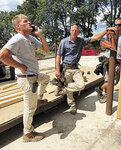
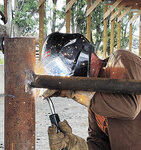
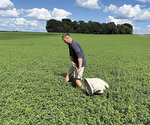
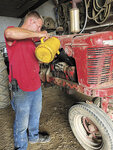
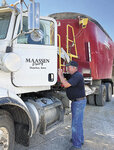
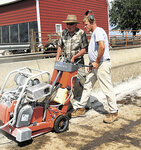
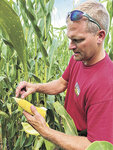
Comments
No comments on this item Please log in to comment by clicking here